
Far too many households are paying too much for electricity, according to a new ACCC report. Photo: File.
Competition in the electricity market must improve if millions of Australians are to avoid paying too much for their household power.
That’s the view of the Australian Competition and Consumer Commission (ACCC), which has released its latest Electricity Market Inquiry Report.
It is the ACCC’s 10 report as part of its inquiry into the prices, profits and margins in the supply of electricity in the National Electricity Market.
And it has found that 79 per cent of Aussie households are on higher-priced electricity plans than they need to be.
For the first time in its ongoing electricity inquiry, the ACCC collected new information from retailers to understand how they are changing prices for their existing customers.
The analysis draws on that dataset to assess pricing outcomes for existing customers, and how those charges compare with the default offer prices and new-acquisition offers in the market.
“Electricity retailers offer cheaper plans to attract new customers but over time we observe these plans becoming relatively more expensive, so many loyal customers will be paying more than they need to be,” ACCC Commissioner Anna Brakey said.
“Prices for new customers tend to be competitive, but we are concerned that the market is not delivering for customers who do not regularly switch from or engage with their existing retailer.”
The ACCC has concluded that far too many Australian households are on a more expensive electricity plan than they need to be, and changes are needed to improve competition in the electricity market and deliver better outcomes for consumers.
It collected the prices of flat-rate market offers for more than five million residential customers and compared them with prices available to new customers and the prices of government-set default offers.
Flat-rate, rather than time-of-use or demand, is the tariff type that most households are on.
The report also shows that the estimated cost for residential customers on market offers (flat rate) increased by significantly more than the default offers.
“Almost half of all households on flat-rate market offers were paying equal to or more than the default offer, which was intended to be a reference price and safety net to protect disengaged consumers from unreasonably high prices,” Ms Brakey said.
“For most customers there are plans currently in the market that are cheaper than the default offer.
“We strongly encourage consumers to use the government energy price comparison sites to find a cheaper deal, but we’re also recommending that policy makers identify and address the barriers that are preventing many people from changing electricity plans and accessing cheaper market offers.”
The ACCC is encouraging energy consumers to actively seek out better and cheaper deals.
Its report makes four recommendations:
- Policy makers should investigate how best to reduce the number of customers on legacy plans with large conditional discounts, as a matter of priority.
- The next review of the Electricity Retail Code to be undertaken by the Department of Climate Change, Energy, the Environment and Water should focus on consumer disengagement, the increasing complexity of retail tariff structures, and interactions with other reforms.
- The government should investigate, in consultation with the ASX and market participants, whether there are ways to support new hedging products being listed on the ASX in a timelier manner.
- Governments can increase liquidity in the contract market during the energy transition by making more contracts available from government-supported renewable energy and storage projects.
“As Australia transitions to predominantly sourcing electricity from renewable energy generation in an effort to reduce greenhouse gas emissions, the National Electricity Market will need to continue to evolve …” the report states.
“Effective competition in the retail market is in the long-term interests of consumers, as it puts downward pressure on retail prices and encourages a greater variety of products and services.
“Given smaller, newer retailers play an important role in driving competition in the market, it is crucial that barriers for retailers entering the market, and existing retailers expanding their customer base, are not too high as the energy transition unfolds.”




















